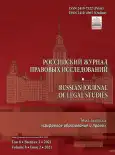Theoretical and Legal analysis of Modern Approaches to the Concept of International Crime
- 作者: Lobach D.V.1
-
隶属关系:
- Far Eastern Law Institute (branch) of the University of the Prosecutor's Office of the Russian Federation
- 期: 卷 8, 编号 2 (2021)
- 页面: 79-86
- 栏目: Criminal law and process
- ##submission.dateSubmitted##: 30.05.2021
- ##submission.dateAccepted##: 02.06.2021
- ##submission.datePublished##: 12.08.2021
- URL: https://journals.eco-vector.com/2410-7522/article/view/71110
- DOI: https://doi.org/10.17816/RJLS71110
- ID: 71110
如何引用文章
详细
The article attempts to study the political and legal essence (nature) of international crime as a negative impact of social reality in the analysis of various approaches. It is concluded that the concept of “international crime” in the context of modern trends in globalization and transformation of social relations is relevant by its definition. It is argued that in the theory of international criminal law, there are four approaches, different defining factors that comprise the contextual element of an international crime — violations of international peremptory norms (jus cogens); the special nature of the external expression of such acts indicating the inherent danger of the phenomenon (as, for example, the direction of intent, seriousness and scale, special attitude on the part of the international community); functional relationship with an agent acting as a criminal policy; and encroachment on international peace and human security. Modern methods of development of the international community are applied in modern literature) as are torture, encroachments on persons enjoying international immunity, international terrorism, piracy, illegal circulation of weapons of mass destruction, etc. The option of criminalizing acts that infringe on international peace and human security and are committed as international crimes is also not excluded. An international crime is a complex affair committed in the context of institutional politics, infringing on international peace and security, and challenging the concept of the international community, thus, falling under universal jurisdiction.
全文:
作者简介
Dmitriy Lobach
Far Eastern Law Institute (branch) of the University of the Prosecutor's Office of the Russian Federation
编辑信件的主要联系方式.
Email: dimaved85@mail.ru
ORCID iD: 0000-0002-7229-439X
SPIN 代码: 3450-7023
Researcher ID: U-1713-2019
PhD in law, associate professor
俄罗斯联邦, Vladivostok参考
- Trikoz YeN. Formirovaniye kontseptual'noy modeli prestupleniy protiv mira i chelovechestva bezopasnosti. Gosudarstvo i pravo. 2007;(8):97–104. (In Russ.).
- Bassiouni MCh. International Crimes: Jus Cogens and Obligation Erga Omnes. Law and contemporary problems. 1996;59(4): 63–74.
- Bassiouni MCh, Wise M. Aut dedere aut judicare: the duty to extradite or prosecute in international law. Dordrecht, United Kingdom: Martinus Nijhoff Publishers, 1995. 318 p.
- Carsten SA Critical Introduction to International Criminal Law. Cambridge, United Kingdom: Cambridge University Press, 2019. 468 p.
- McCormack T, Simpson GJ. The International Law Commission's Draft Code of Crimes against the Peace and Security of Mankind: An Appraisal of the Substantive Provisions. Criminal Law Forum. 1994;5(1):1–55.
- Heller KJ, Megret F, Nouwen S, Ohlin JD, Robinson D. International criminal law. Oxford, United Kingdom: Oxford University Press, 2020. 686 p.
- Bassiouni Ch. Introduction to international criminal law. Boston, USA: Martinus Nijhoff Publishers, 2014. 1258 p.
- Kittichaisaree K. Public international law of cyberspace. Switzerland: Springer International Publishing Switzerland, 2017. 401 p.
- Dinstein Y. War, aggression and self-defence. Cambridge, United Kingdom: Cambridge University Press, 2012. 349 p.
- Lilienthal G, Nehaluddin A. Cyber-attack as inevitable kinetic war. Computer Law & Security Review. 2015;31(3):390–400.
- Brownlie L. International law and the use of force by states. London, United Kingdom: Clarendon, 1963. 532 p.
补充文件






